Knowledge Management & Intelligent Systems Analysis - Curtin Univ.
VerifiedAdded on 2023/06/12
|9
|1818
|480
Report
AI Summary
This report delves into the analysis of knowledge management and intelligent systems, drawing upon several research articles to explore the practical applications and theoretical underpinnings of these concepts. It identifies research methods such as survey methodologies and statistical analysis used in the reviewed articles. The report discusses arguments made by various authors regarding the benefits and challenges of implementing knowledge management systems (KMS), including their impact on organizational structure, innovation, and strategic vision. It considers the role of knowledge-oriented leadership and the importance of information and communication technology (ICT) in enhancing KMS efficiency. Observations highlight the significance of a positive work culture in supporting knowledge facilitation and the potential of technologies like the Internet of Things to transform organizations. The report concludes by summarizing the key findings and emphasizing the need to address challenges associated with knowledge management to foster innovation and improve organizational performance. Desklib provides access to this and other solved assignments to aid students.
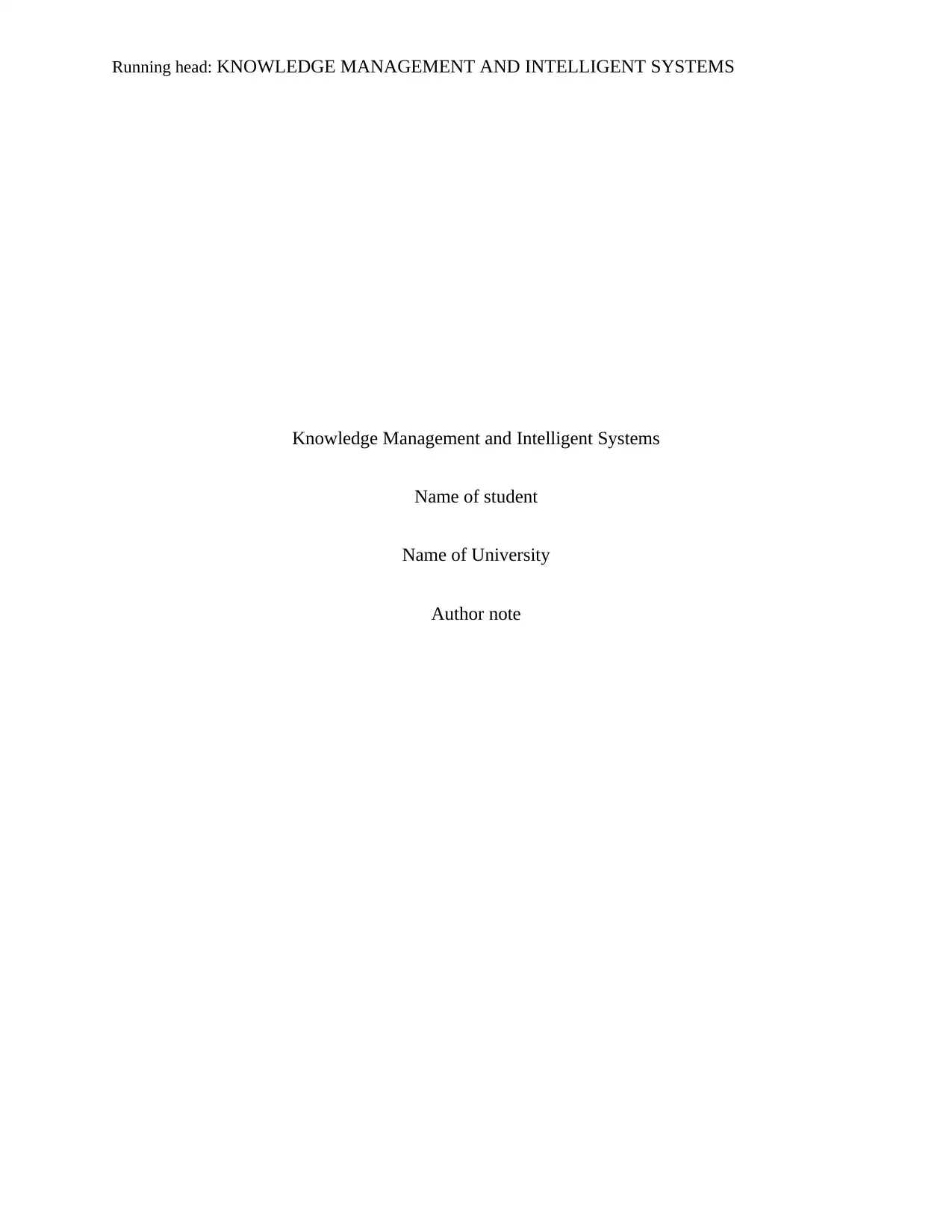
Running head: KNOWLEDGE MANAGEMENT AND INTELLIGENT SYSTEMS
Knowledge Management and Intelligent Systems
Name of student
Name of University
Author note
Knowledge Management and Intelligent Systems
Name of student
Name of University
Author note
Paraphrase This Document
Need a fresh take? Get an instant paraphrase of this document with our AI Paraphraser
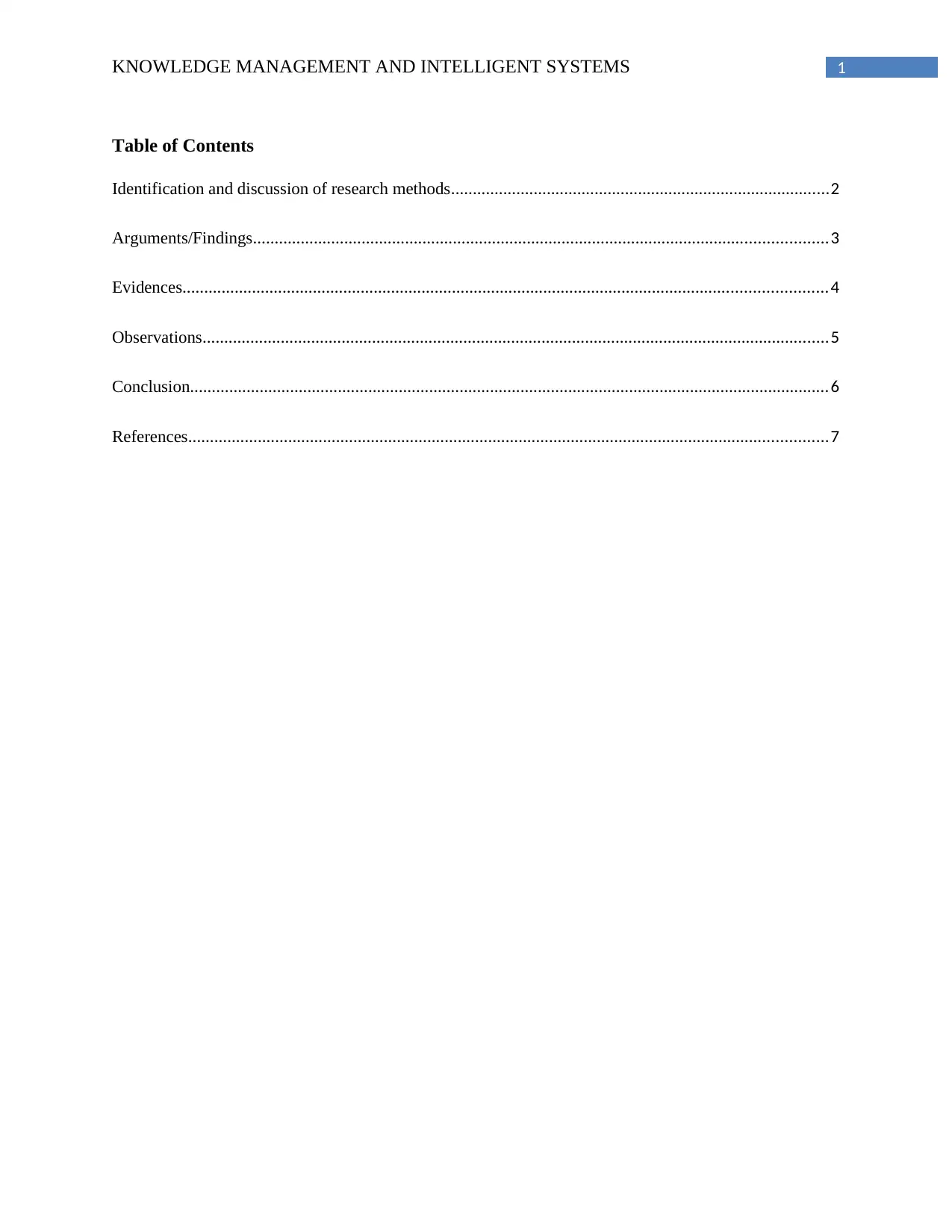
1KNOWLEDGE MANAGEMENT AND INTELLIGENT SYSTEMS
Table of Contents
Identification and discussion of research methods.......................................................................................2
Arguments/Findings....................................................................................................................................3
Evidences....................................................................................................................................................4
Observations................................................................................................................................................5
Conclusion...................................................................................................................................................6
References...................................................................................................................................................7
Table of Contents
Identification and discussion of research methods.......................................................................................2
Arguments/Findings....................................................................................................................................3
Evidences....................................................................................................................................................4
Observations................................................................................................................................................5
Conclusion...................................................................................................................................................6
References...................................................................................................................................................7
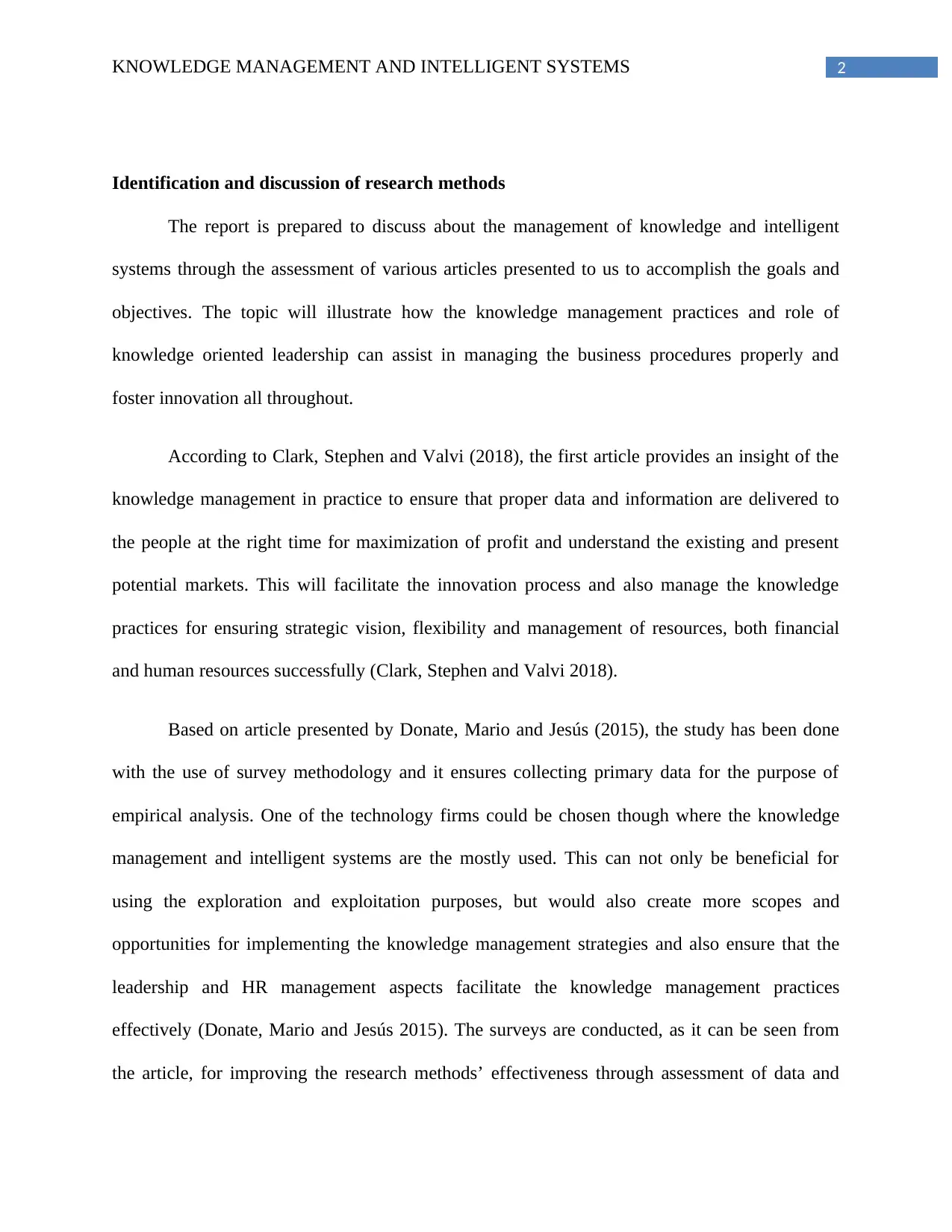
2KNOWLEDGE MANAGEMENT AND INTELLIGENT SYSTEMS
Identification and discussion of research methods
The report is prepared to discuss about the management of knowledge and intelligent
systems through the assessment of various articles presented to us to accomplish the goals and
objectives. The topic will illustrate how the knowledge management practices and role of
knowledge oriented leadership can assist in managing the business procedures properly and
foster innovation all throughout.
According to Clark, Stephen and Valvi (2018), the first article provides an insight of the
knowledge management in practice to ensure that proper data and information are delivered to
the people at the right time for maximization of profit and understand the existing and present
potential markets. This will facilitate the innovation process and also manage the knowledge
practices for ensuring strategic vision, flexibility and management of resources, both financial
and human resources successfully (Clark, Stephen and Valvi 2018).
Based on article presented by Donate, Mario and Jesús (2015), the study has been done
with the use of survey methodology and it ensures collecting primary data for the purpose of
empirical analysis. One of the technology firms could be chosen though where the knowledge
management and intelligent systems are the mostly used. This can not only be beneficial for
using the exploration and exploitation purposes, but would also create more scopes and
opportunities for implementing the knowledge management strategies and also ensure that the
leadership and HR management aspects facilitate the knowledge management practices
effectively (Donate, Mario and Jesús 2015). The surveys are conducted, as it can be seen from
the article, for improving the research methods’ effectiveness through assessment of data and
Identification and discussion of research methods
The report is prepared to discuss about the management of knowledge and intelligent
systems through the assessment of various articles presented to us to accomplish the goals and
objectives. The topic will illustrate how the knowledge management practices and role of
knowledge oriented leadership can assist in managing the business procedures properly and
foster innovation all throughout.
According to Clark, Stephen and Valvi (2018), the first article provides an insight of the
knowledge management in practice to ensure that proper data and information are delivered to
the people at the right time for maximization of profit and understand the existing and present
potential markets. This will facilitate the innovation process and also manage the knowledge
practices for ensuring strategic vision, flexibility and management of resources, both financial
and human resources successfully (Clark, Stephen and Valvi 2018).
Based on article presented by Donate, Mario and Jesús (2015), the study has been done
with the use of survey methodology and it ensures collecting primary data for the purpose of
empirical analysis. One of the technology firms could be chosen though where the knowledge
management and intelligent systems are the mostly used. This can not only be beneficial for
using the exploration and exploitation purposes, but would also create more scopes and
opportunities for implementing the knowledge management strategies and also ensure that the
leadership and HR management aspects facilitate the knowledge management practices
effectively (Donate, Mario and Jesús 2015). The surveys are conducted, as it can be seen from
the article, for improving the research methods’ effectiveness through assessment of data and
⊘ This is a preview!⊘
Do you want full access?
Subscribe today to unlock all pages.

Trusted by 1+ million students worldwide
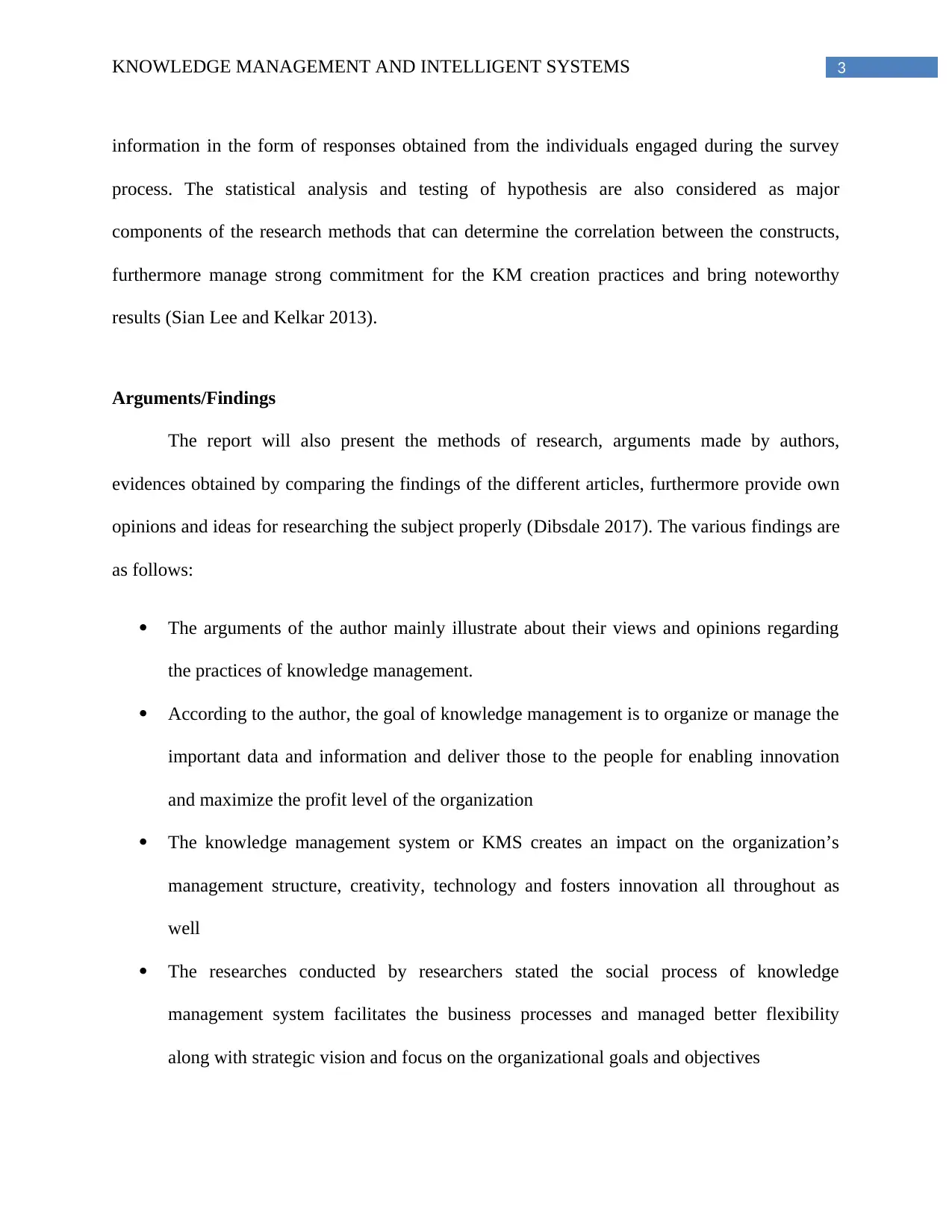
3KNOWLEDGE MANAGEMENT AND INTELLIGENT SYSTEMS
information in the form of responses obtained from the individuals engaged during the survey
process. The statistical analysis and testing of hypothesis are also considered as major
components of the research methods that can determine the correlation between the constructs,
furthermore manage strong commitment for the KM creation practices and bring noteworthy
results (Sian Lee and Kelkar 2013).
Arguments/Findings
The report will also present the methods of research, arguments made by authors,
evidences obtained by comparing the findings of the different articles, furthermore provide own
opinions and ideas for researching the subject properly (Dibsdale 2017). The various findings are
as follows:
The arguments of the author mainly illustrate about their views and opinions regarding
the practices of knowledge management.
According to the author, the goal of knowledge management is to organize or manage the
important data and information and deliver those to the people for enabling innovation
and maximize the profit level of the organization
The knowledge management system or KMS creates an impact on the organization’s
management structure, creativity, technology and fosters innovation all throughout as
well
The researches conducted by researchers stated the social process of knowledge
management system facilitates the business processes and managed better flexibility
along with strategic vision and focus on the organizational goals and objectives
information in the form of responses obtained from the individuals engaged during the survey
process. The statistical analysis and testing of hypothesis are also considered as major
components of the research methods that can determine the correlation between the constructs,
furthermore manage strong commitment for the KM creation practices and bring noteworthy
results (Sian Lee and Kelkar 2013).
Arguments/Findings
The report will also present the methods of research, arguments made by authors,
evidences obtained by comparing the findings of the different articles, furthermore provide own
opinions and ideas for researching the subject properly (Dibsdale 2017). The various findings are
as follows:
The arguments of the author mainly illustrate about their views and opinions regarding
the practices of knowledge management.
According to the author, the goal of knowledge management is to organize or manage the
important data and information and deliver those to the people for enabling innovation
and maximize the profit level of the organization
The knowledge management system or KMS creates an impact on the organization’s
management structure, creativity, technology and fosters innovation all throughout as
well
The researches conducted by researchers stated the social process of knowledge
management system facilitates the business processes and managed better flexibility
along with strategic vision and focus on the organizational goals and objectives
Paraphrase This Document
Need a fresh take? Get an instant paraphrase of this document with our AI Paraphraser
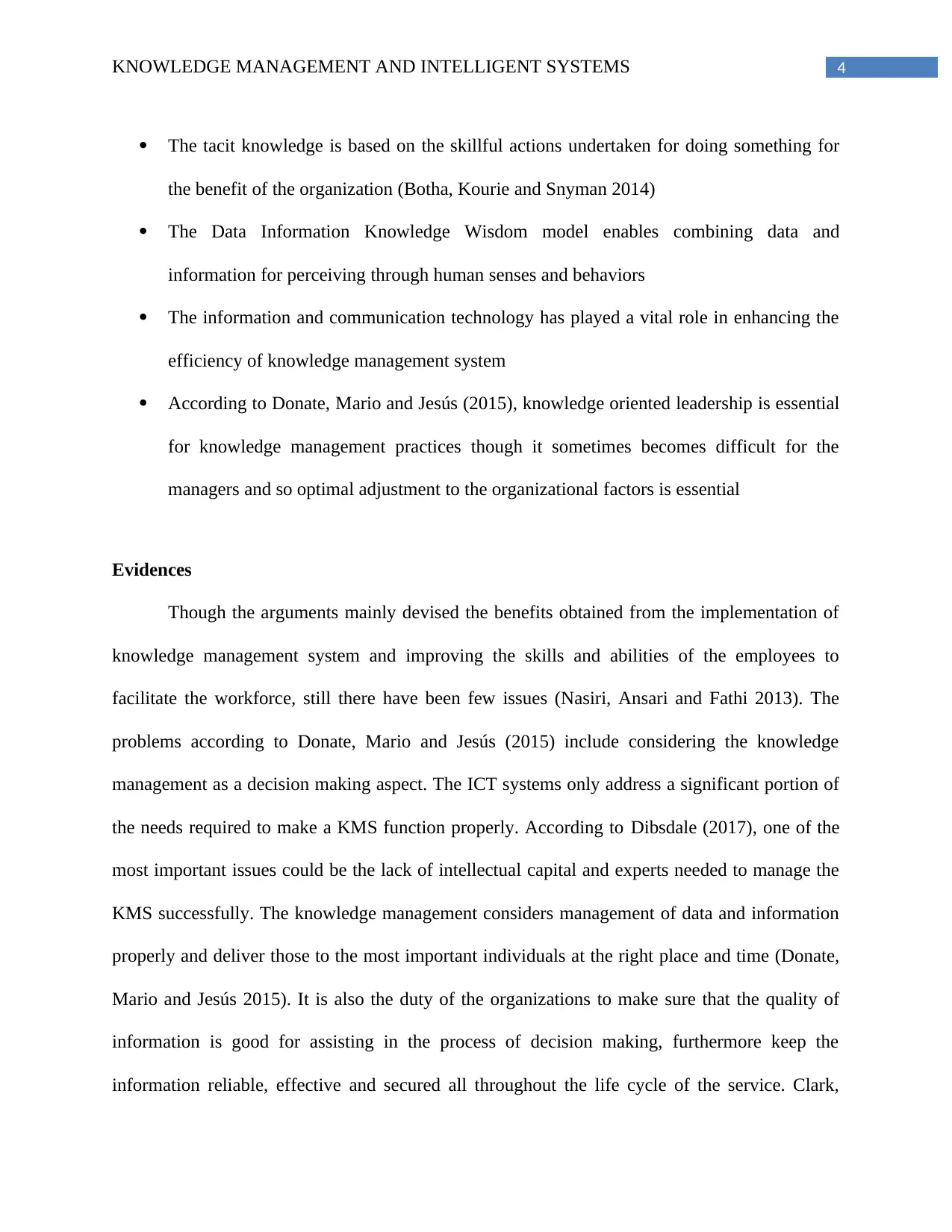
4KNOWLEDGE MANAGEMENT AND INTELLIGENT SYSTEMS
The tacit knowledge is based on the skillful actions undertaken for doing something for
the benefit of the organization (Botha, Kourie and Snyman 2014)
The Data Information Knowledge Wisdom model enables combining data and
information for perceiving through human senses and behaviors
The information and communication technology has played a vital role in enhancing the
efficiency of knowledge management system
According to Donate, Mario and Jesús (2015), knowledge oriented leadership is essential
for knowledge management practices though it sometimes becomes difficult for the
managers and so optimal adjustment to the organizational factors is essential
Evidences
Though the arguments mainly devised the benefits obtained from the implementation of
knowledge management system and improving the skills and abilities of the employees to
facilitate the workforce, still there have been few issues (Nasiri, Ansari and Fathi 2013). The
problems according to Donate, Mario and Jesús (2015) include considering the knowledge
management as a decision making aspect. The ICT systems only address a significant portion of
the needs required to make a KMS function properly. According to Dibsdale (2017), one of the
most important issues could be the lack of intellectual capital and experts needed to manage the
KMS successfully. The knowledge management considers management of data and information
properly and deliver those to the most important individuals at the right place and time (Donate,
Mario and Jesús 2015). It is also the duty of the organizations to make sure that the quality of
information is good for assisting in the process of decision making, furthermore keep the
information reliable, effective and secured all throughout the life cycle of the service. Clark,
The tacit knowledge is based on the skillful actions undertaken for doing something for
the benefit of the organization (Botha, Kourie and Snyman 2014)
The Data Information Knowledge Wisdom model enables combining data and
information for perceiving through human senses and behaviors
The information and communication technology has played a vital role in enhancing the
efficiency of knowledge management system
According to Donate, Mario and Jesús (2015), knowledge oriented leadership is essential
for knowledge management practices though it sometimes becomes difficult for the
managers and so optimal adjustment to the organizational factors is essential
Evidences
Though the arguments mainly devised the benefits obtained from the implementation of
knowledge management system and improving the skills and abilities of the employees to
facilitate the workforce, still there have been few issues (Nasiri, Ansari and Fathi 2013). The
problems according to Donate, Mario and Jesús (2015) include considering the knowledge
management as a decision making aspect. The ICT systems only address a significant portion of
the needs required to make a KMS function properly. According to Dibsdale (2017), one of the
most important issues could be the lack of intellectual capital and experts needed to manage the
KMS successfully. The knowledge management considers management of data and information
properly and deliver those to the most important individuals at the right place and time (Donate,
Mario and Jesús 2015). It is also the duty of the organizations to make sure that the quality of
information is good for assisting in the process of decision making, furthermore keep the
information reliable, effective and secured all throughout the life cycle of the service. Clark,
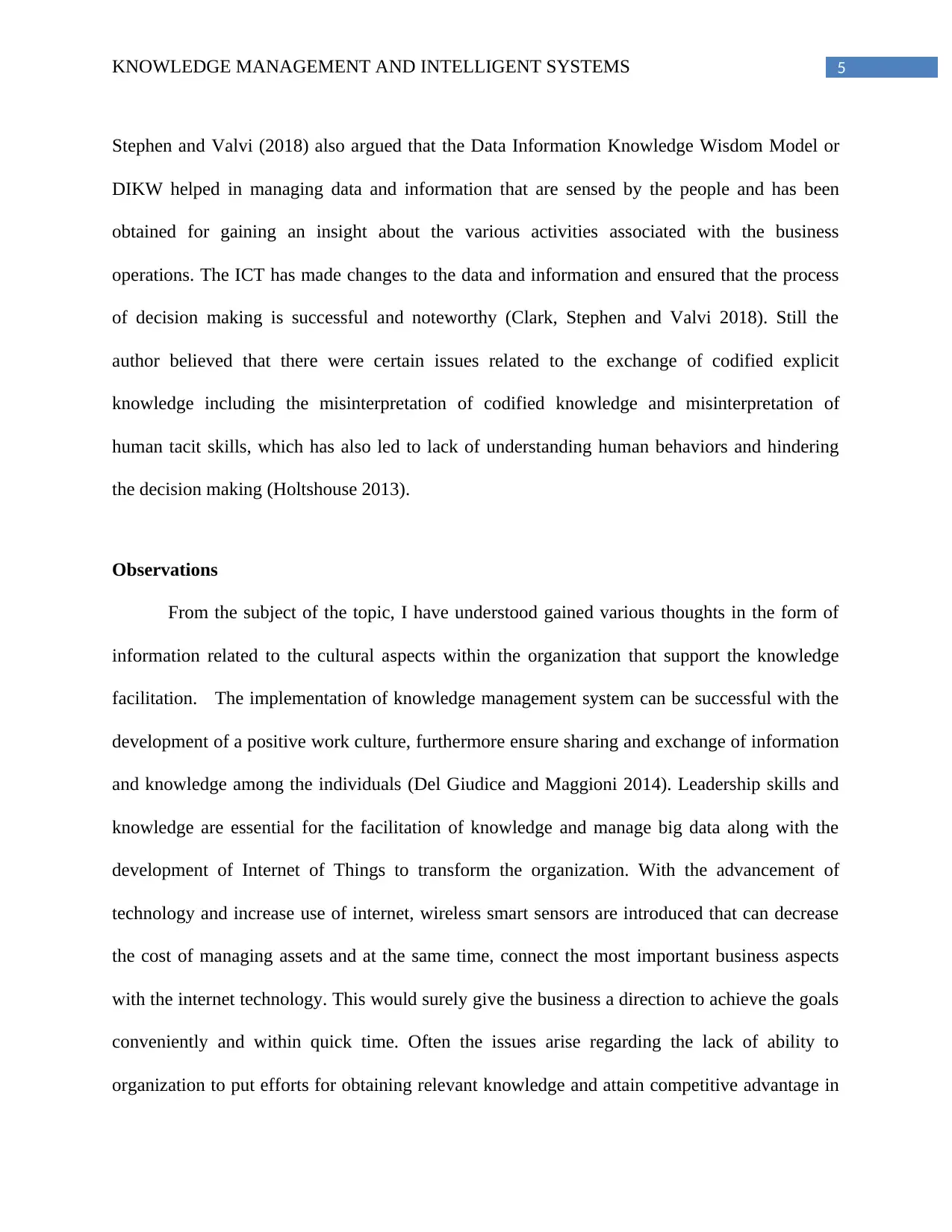
5KNOWLEDGE MANAGEMENT AND INTELLIGENT SYSTEMS
Stephen and Valvi (2018) also argued that the Data Information Knowledge Wisdom Model or
DIKW helped in managing data and information that are sensed by the people and has been
obtained for gaining an insight about the various activities associated with the business
operations. The ICT has made changes to the data and information and ensured that the process
of decision making is successful and noteworthy (Clark, Stephen and Valvi 2018). Still the
author believed that there were certain issues related to the exchange of codified explicit
knowledge including the misinterpretation of codified knowledge and misinterpretation of
human tacit skills, which has also led to lack of understanding human behaviors and hindering
the decision making (Holtshouse 2013).
Observations
From the subject of the topic, I have understood gained various thoughts in the form of
information related to the cultural aspects within the organization that support the knowledge
facilitation. The implementation of knowledge management system can be successful with the
development of a positive work culture, furthermore ensure sharing and exchange of information
and knowledge among the individuals (Del Giudice and Maggioni 2014). Leadership skills and
knowledge are essential for the facilitation of knowledge and manage big data along with the
development of Internet of Things to transform the organization. With the advancement of
technology and increase use of internet, wireless smart sensors are introduced that can decrease
the cost of managing assets and at the same time, connect the most important business aspects
with the internet technology. This would surely give the business a direction to achieve the goals
conveniently and within quick time. Often the issues arise regarding the lack of ability to
organization to put efforts for obtaining relevant knowledge and attain competitive advantage in
Stephen and Valvi (2018) also argued that the Data Information Knowledge Wisdom Model or
DIKW helped in managing data and information that are sensed by the people and has been
obtained for gaining an insight about the various activities associated with the business
operations. The ICT has made changes to the data and information and ensured that the process
of decision making is successful and noteworthy (Clark, Stephen and Valvi 2018). Still the
author believed that there were certain issues related to the exchange of codified explicit
knowledge including the misinterpretation of codified knowledge and misinterpretation of
human tacit skills, which has also led to lack of understanding human behaviors and hindering
the decision making (Holtshouse 2013).
Observations
From the subject of the topic, I have understood gained various thoughts in the form of
information related to the cultural aspects within the organization that support the knowledge
facilitation. The implementation of knowledge management system can be successful with the
development of a positive work culture, furthermore ensure sharing and exchange of information
and knowledge among the individuals (Del Giudice and Maggioni 2014). Leadership skills and
knowledge are essential for the facilitation of knowledge and manage big data along with the
development of Internet of Things to transform the organization. With the advancement of
technology and increase use of internet, wireless smart sensors are introduced that can decrease
the cost of managing assets and at the same time, connect the most important business aspects
with the internet technology. This would surely give the business a direction to achieve the goals
conveniently and within quick time. Often the issues arise regarding the lack of ability to
organization to put efforts for obtaining relevant knowledge and attain competitive advantage in
⊘ This is a preview!⊘
Do you want full access?
Subscribe today to unlock all pages.

Trusted by 1+ million students worldwide
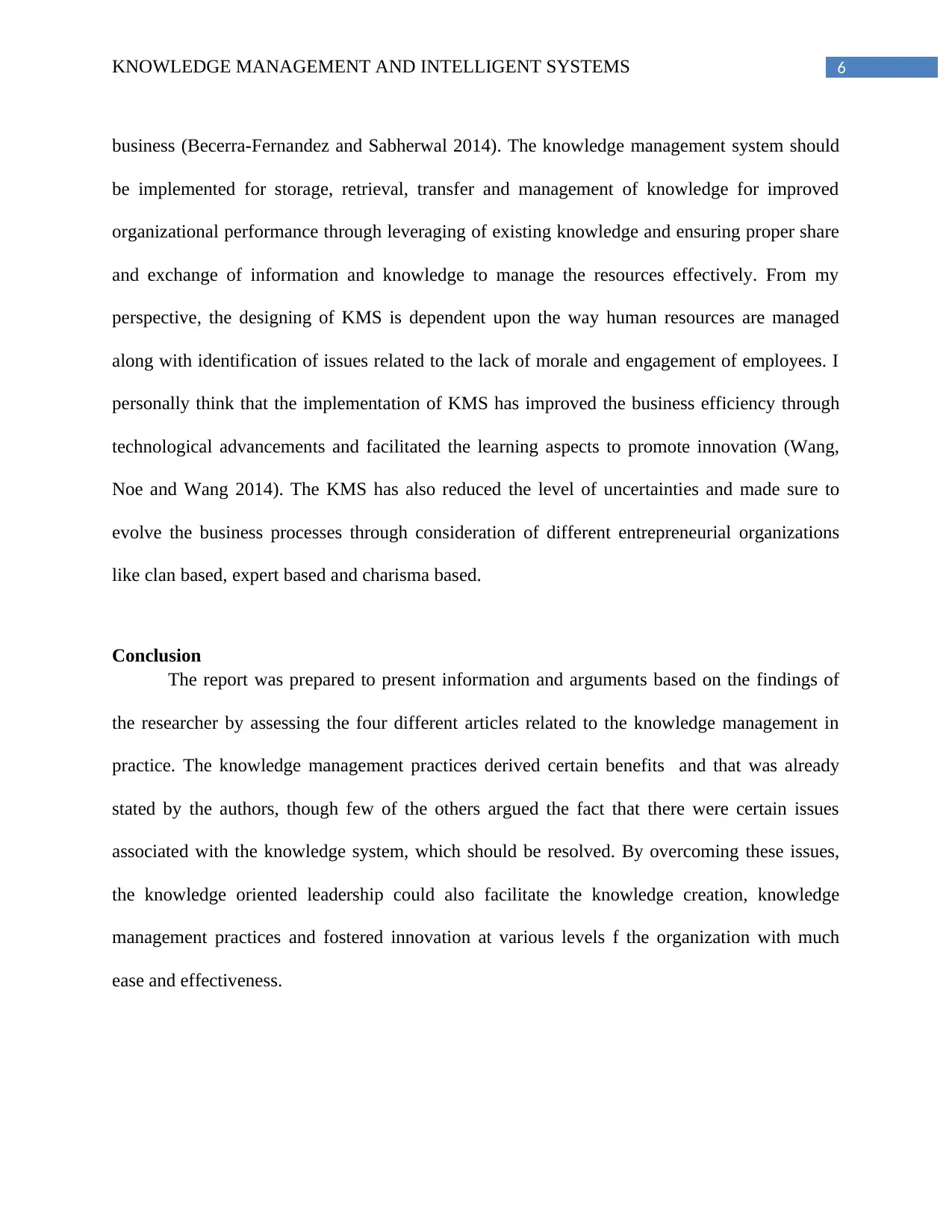
6KNOWLEDGE MANAGEMENT AND INTELLIGENT SYSTEMS
business (Becerra-Fernandez and Sabherwal 2014). The knowledge management system should
be implemented for storage, retrieval, transfer and management of knowledge for improved
organizational performance through leveraging of existing knowledge and ensuring proper share
and exchange of information and knowledge to manage the resources effectively. From my
perspective, the designing of KMS is dependent upon the way human resources are managed
along with identification of issues related to the lack of morale and engagement of employees. I
personally think that the implementation of KMS has improved the business efficiency through
technological advancements and facilitated the learning aspects to promote innovation (Wang,
Noe and Wang 2014). The KMS has also reduced the level of uncertainties and made sure to
evolve the business processes through consideration of different entrepreneurial organizations
like clan based, expert based and charisma based.
Conclusion
The report was prepared to present information and arguments based on the findings of
the researcher by assessing the four different articles related to the knowledge management in
practice. The knowledge management practices derived certain benefits and that was already
stated by the authors, though few of the others argued the fact that there were certain issues
associated with the knowledge system, which should be resolved. By overcoming these issues,
the knowledge oriented leadership could also facilitate the knowledge creation, knowledge
management practices and fostered innovation at various levels f the organization with much
ease and effectiveness.
business (Becerra-Fernandez and Sabherwal 2014). The knowledge management system should
be implemented for storage, retrieval, transfer and management of knowledge for improved
organizational performance through leveraging of existing knowledge and ensuring proper share
and exchange of information and knowledge to manage the resources effectively. From my
perspective, the designing of KMS is dependent upon the way human resources are managed
along with identification of issues related to the lack of morale and engagement of employees. I
personally think that the implementation of KMS has improved the business efficiency through
technological advancements and facilitated the learning aspects to promote innovation (Wang,
Noe and Wang 2014). The KMS has also reduced the level of uncertainties and made sure to
evolve the business processes through consideration of different entrepreneurial organizations
like clan based, expert based and charisma based.
Conclusion
The report was prepared to present information and arguments based on the findings of
the researcher by assessing the four different articles related to the knowledge management in
practice. The knowledge management practices derived certain benefits and that was already
stated by the authors, though few of the others argued the fact that there were certain issues
associated with the knowledge system, which should be resolved. By overcoming these issues,
the knowledge oriented leadership could also facilitate the knowledge creation, knowledge
management practices and fostered innovation at various levels f the organization with much
ease and effectiveness.
Paraphrase This Document
Need a fresh take? Get an instant paraphrase of this document with our AI Paraphraser
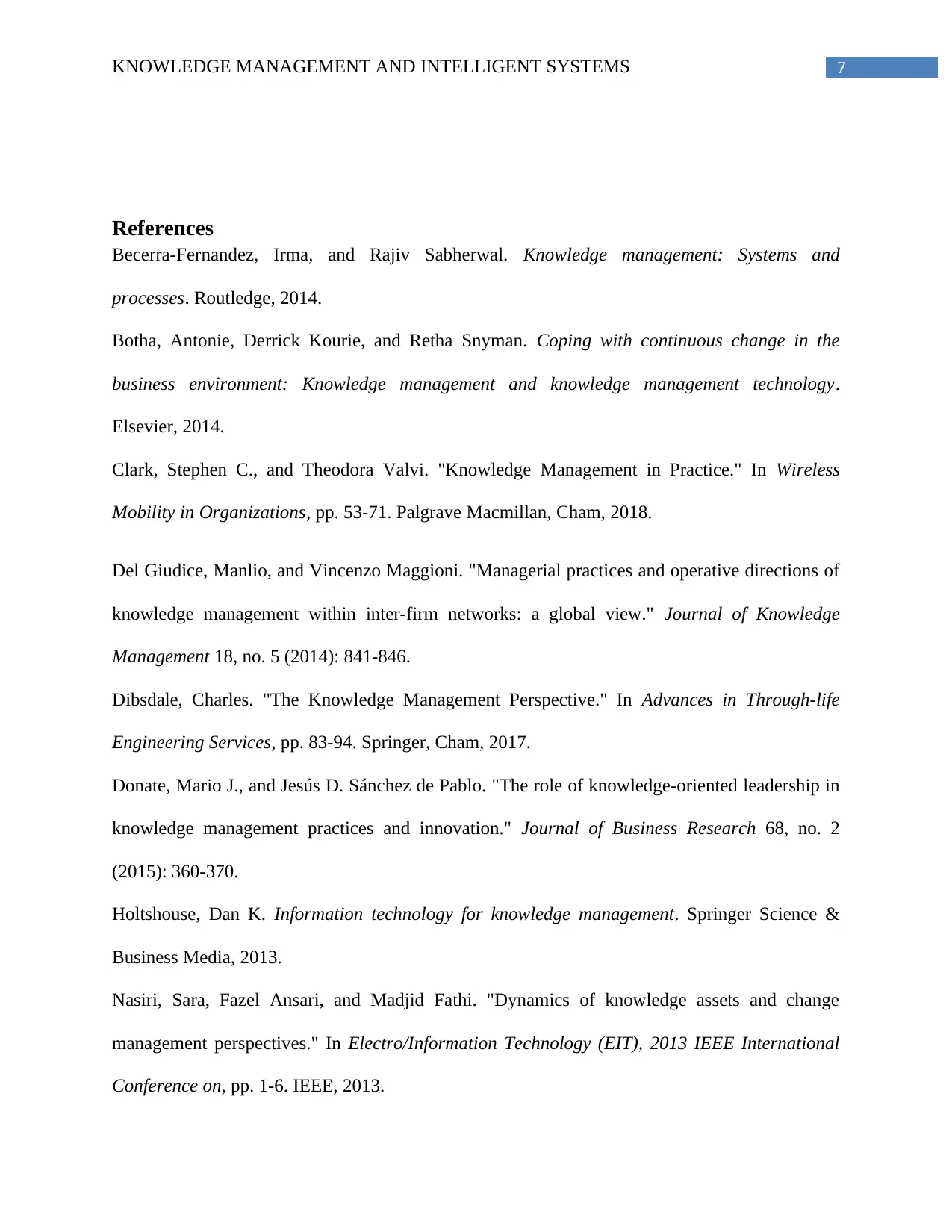
7KNOWLEDGE MANAGEMENT AND INTELLIGENT SYSTEMS
References
Becerra-Fernandez, Irma, and Rajiv Sabherwal. Knowledge management: Systems and
processes. Routledge, 2014.
Botha, Antonie, Derrick Kourie, and Retha Snyman. Coping with continuous change in the
business environment: Knowledge management and knowledge management technology.
Elsevier, 2014.
Clark, Stephen C., and Theodora Valvi. "Knowledge Management in Practice." In Wireless
Mobility in Organizations, pp. 53-71. Palgrave Macmillan, Cham, 2018.
Del Giudice, Manlio, and Vincenzo Maggioni. "Managerial practices and operative directions of
knowledge management within inter-firm networks: a global view." Journal of Knowledge
Management 18, no. 5 (2014): 841-846.
Dibsdale, Charles. "The Knowledge Management Perspective." In Advances in Through-life
Engineering Services, pp. 83-94. Springer, Cham, 2017.
Donate, Mario J., and Jesús D. Sánchez de Pablo. "The role of knowledge-oriented leadership in
knowledge management practices and innovation." Journal of Business Research 68, no. 2
(2015): 360-370.
Holtshouse, Dan K. Information technology for knowledge management. Springer Science &
Business Media, 2013.
Nasiri, Sara, Fazel Ansari, and Madjid Fathi. "Dynamics of knowledge assets and change
management perspectives." In Electro/Information Technology (EIT), 2013 IEEE International
Conference on, pp. 1-6. IEEE, 2013.
References
Becerra-Fernandez, Irma, and Rajiv Sabherwal. Knowledge management: Systems and
processes. Routledge, 2014.
Botha, Antonie, Derrick Kourie, and Retha Snyman. Coping with continuous change in the
business environment: Knowledge management and knowledge management technology.
Elsevier, 2014.
Clark, Stephen C., and Theodora Valvi. "Knowledge Management in Practice." In Wireless
Mobility in Organizations, pp. 53-71. Palgrave Macmillan, Cham, 2018.
Del Giudice, Manlio, and Vincenzo Maggioni. "Managerial practices and operative directions of
knowledge management within inter-firm networks: a global view." Journal of Knowledge
Management 18, no. 5 (2014): 841-846.
Dibsdale, Charles. "The Knowledge Management Perspective." In Advances in Through-life
Engineering Services, pp. 83-94. Springer, Cham, 2017.
Donate, Mario J., and Jesús D. Sánchez de Pablo. "The role of knowledge-oriented leadership in
knowledge management practices and innovation." Journal of Business Research 68, no. 2
(2015): 360-370.
Holtshouse, Dan K. Information technology for knowledge management. Springer Science &
Business Media, 2013.
Nasiri, Sara, Fazel Ansari, and Madjid Fathi. "Dynamics of knowledge assets and change
management perspectives." In Electro/Information Technology (EIT), 2013 IEEE International
Conference on, pp. 1-6. IEEE, 2013.
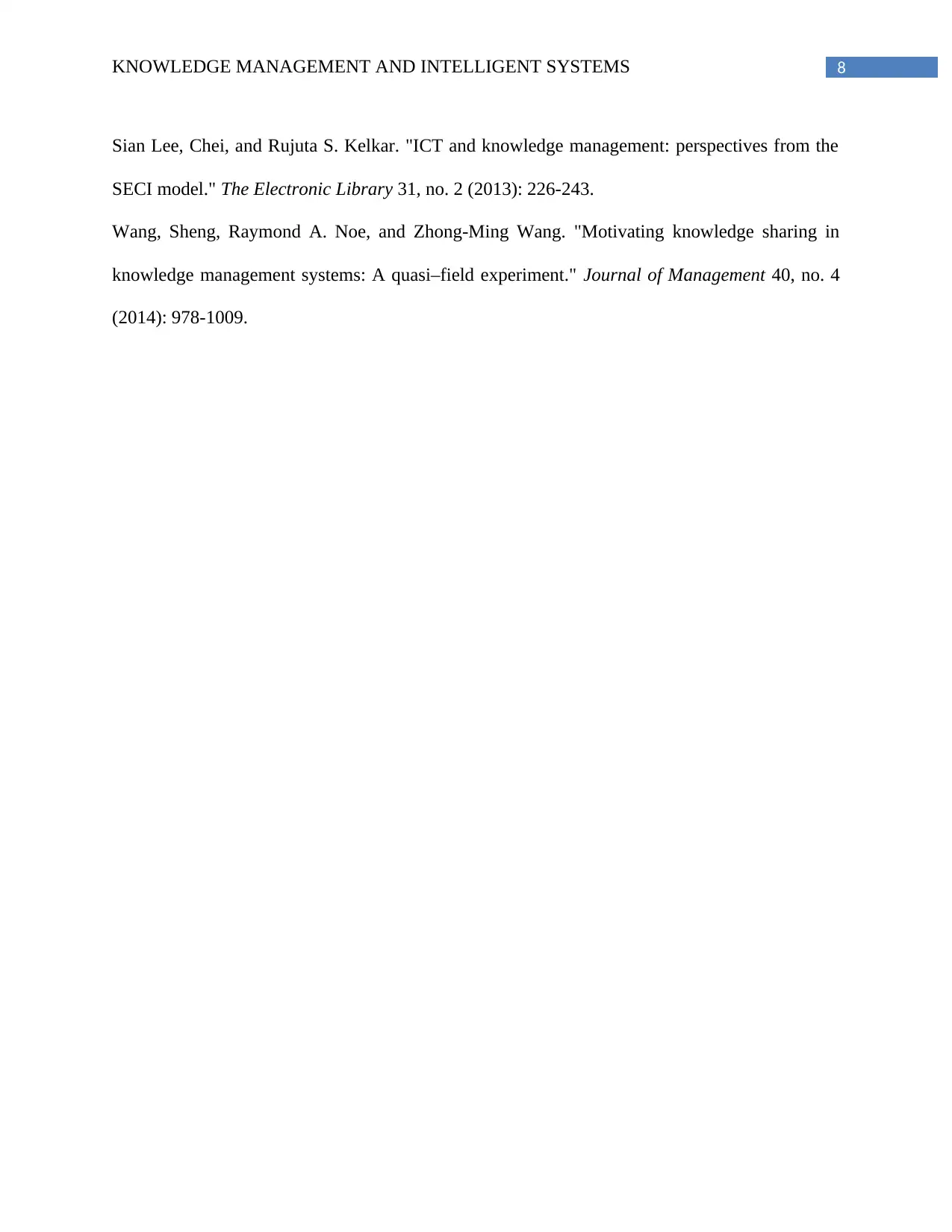
8KNOWLEDGE MANAGEMENT AND INTELLIGENT SYSTEMS
Sian Lee, Chei, and Rujuta S. Kelkar. "ICT and knowledge management: perspectives from the
SECI model." The Electronic Library 31, no. 2 (2013): 226-243.
Wang, Sheng, Raymond A. Noe, and Zhong-Ming Wang. "Motivating knowledge sharing in
knowledge management systems: A quasi–field experiment." Journal of Management 40, no. 4
(2014): 978-1009.
Sian Lee, Chei, and Rujuta S. Kelkar. "ICT and knowledge management: perspectives from the
SECI model." The Electronic Library 31, no. 2 (2013): 226-243.
Wang, Sheng, Raymond A. Noe, and Zhong-Ming Wang. "Motivating knowledge sharing in
knowledge management systems: A quasi–field experiment." Journal of Management 40, no. 4
(2014): 978-1009.
⊘ This is a preview!⊘
Do you want full access?
Subscribe today to unlock all pages.

Trusted by 1+ million students worldwide
1 out of 9
Related Documents
Your All-in-One AI-Powered Toolkit for Academic Success.
+13062052269
info@desklib.com
Available 24*7 on WhatsApp / Email
![[object Object]](/_next/static/media/star-bottom.7253800d.svg)
Unlock your academic potential
Copyright © 2020–2026 A2Z Services. All Rights Reserved. Developed and managed by ZUCOL.




